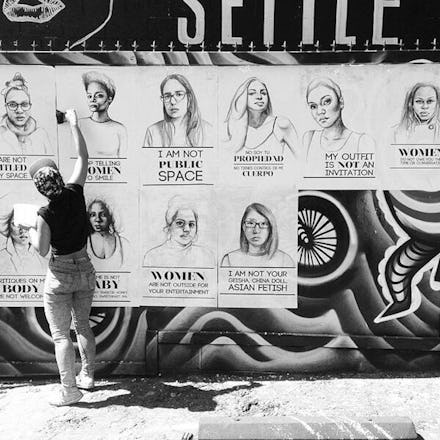7 Things Men Get Wrong About Street Harassment

Why do men not understand the meaning of harassment?
A viral PSA documenting the ceaseless street harassment a woman encounters in New York in one day dovetailed into — you guessed it — more harassment. That woman has received rape and death threats on YouTube and elsewhere since the video's release. Additional YouTube comments expose men's bafflement at how what was being said was harassment.
Harassment is an unwanted, aggressive act of intimidation, whether it's transmitted in person or online. However, many cite women's mere existence as a "cause" of harassment, as if men are reactionary beasts without an iota of free will, decorum or respect. It's also an act of petulance: Men want your attention, ladies, and they want it now.
And if women don't give it to them, they will face the consequences. Case in point is what happened to Sasheer Zamata when her harasser whipped out his dick when she wouldn't give him attention:
In no scenario is such "retaliation" fair. At best, it's an annoyance. At worst, it's deeply damaging, even deadly. It's better to shut things down before they get that far.
Here are seven misconceptions about street harassment, and why they're painfully, unambiguously wrong:
1. "It's a compliment."
No. Unsolicited comments are different than compliments. The key difference is intention: A catcall is an expression of aggression, the compliment courteous admiration.
2. "She asked for it."
No. No one ever asks to be aggressively whistled at, barked at, honked at or yelled at while walking down the street. Women have legs and use them to get places. They're never asking for your opinions or thoughts or desires while moving about in the world.
3. "It's just what men do."
No. Gender constructs demand that masculinity manifest itself in clear-cut, arguably parodic, ways. But shoring up your masculinity is no woman's problem. In fact, men should figure out how to express their masculinity in other, non-harassing ways. Football, anyone?
4. "It's flattering."
No. Just no. Being pestered is not flattering. It's annoying, and it's immature. Catcalls do not make women feel better about themselves; just the opposite: They make women want to hide under layers of clothing so as not to attract unwanted attention.
5. "How is saying 'hi' harassment?"
Saying "hi" is a catcall when it leads to more unwanted attention. Saying "hi" is also a catcall because it is a form of masculine attention-seeking. Go get a dog if you need that kind of validation. Women are not obligated to give it to you.
6. "I just wanted to get her number."
No. Catcalling is not an effective way to get a woman's number, and it would probably behoove you to find another way to respectfully ask out a grown woman.
7. "It's innocent. How does she feel unsafe?"
No. Catcalling is unsafe because, as an unwanted solicitation, it is like a shock to the system. Being a woman walking down the street — as Hollaback!'s video proves — feels like playing a game of "Operation." One step in the wrong direction can get you zinged. Imagine that your daily existence of moving through the world felt like you were walking on eggshells. That's how it feels unsafe.
Catcalling is not necessary, it doesn't make our day better, and it doesn't validate our existence. So, guys (and girls) who may feel a bit unclear about what is and is not harassment, let Jessica Williams clarify the matter: